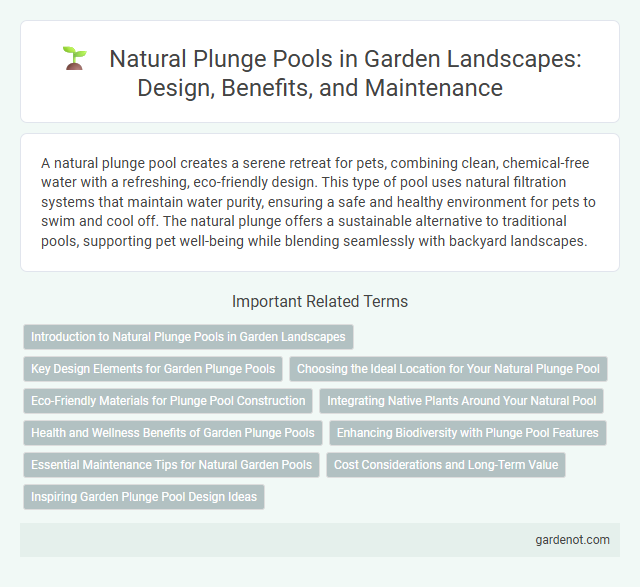A natural plunge pool creates a serene retreat for pets, combining clean, chemical-free water with a refreshing, eco-friendly design. This type of pool uses natural filtration systems that maintain water purity, ensuring a safe and healthy environment for pets to swim and cool off. The natural plunge offers a sustainable alternative to traditional pools, supporting pet well-being while blending seamlessly with backyard landscapes.
Introduction to Natural Plunge Pools in Garden Landscapes
Natural plunge pools in garden landscapes offer a sustainable and visually appealing alternative to traditional swimming pools. These eco-friendly water features use natural filtration systems with aquatic plants and biofilters, promoting biodiversity and maintaining water clarity without harsh chemicals. Integrating a natural plunge pool enhances outdoor living spaces by creating a serene retreat that harmonizes with the surrounding environment.
Key Design Elements for Garden Plunge Pools
Key design elements for garden plunge pools include integrating natural filtration systems such as biofilters and aquatic plants to maintain water clarity without chemicals. The use of locally sourced stone and wood materials enhances the organic aesthetic while providing durability and blending seamlessly with surrounding landscaping. Depth considerations typically range from 1.2 to 1.5 meters, ensuring a refreshing plunge experience while maximizing safety and comfort.
Choosing the Ideal Location for Your Natural Plunge Pool
Selecting the perfect site for your natural plunge pool involves assessing sun exposure, natural terrain, and surrounding vegetation to enhance water quality and aesthetics. Prioritize areas with natural slopes or existing water drainage to facilitate filtration and circulation without mechanical intervention. Proximity to native plants helps maintain ecological balance and supports the pool's integration into the landscape.
Eco-Friendly Materials for Plunge Pool Construction
Natural plunge pools constructed with eco-friendly materials prioritize sustainability through the use of reclaimed wood, natural stone, and non-toxic sealants, reducing environmental impact. These materials promote water filtration and habitat preservation by mimicking natural ecosystems, enhancing biodiversity around the pool area. Employing biodegradable liners and plant-based construction components further supports eco-conscious design in plunge pool development.
Integrating Native Plants Around Your Natural Pool
Incorporating native plants around your natural plunge enhances water purification and supports local wildlife by creating a balanced ecosystem. These plants act as natural biofilters, absorbing excess nutrients and preventing algae growth, which maintains crystal-clear water. Selecting species adapted to your region ensures low maintenance, drought resistance, and promotes biodiversity within your backyard oasis.
Health and Wellness Benefits of Garden Plunge Pools
Natural plunge pools offer significant health benefits by promoting relaxation and reducing stress through their tranquil, chemical-free environments. The garden setting enhances mental well-being and encourages outdoor activity, improving cardiovascular health and boosting immune function. Immersion in natural water helps soothe muscles, alleviate joint pain, and supports overall physical recovery and wellness.
Enhancing Biodiversity with Plunge Pool Features
Natural plunge pools create microhabitats that support diverse aquatic plants and invertebrates, boosting local biodiversity. Designed with varied depths and natural filtration systems, these pools encourage the proliferation of beneficial microorganisms and amphibians. Integrating native vegetation around the plunge pool further enhances habitat complexity and ecosystem resilience.
Essential Maintenance Tips for Natural Garden Pools
Maintaining a natural plunge pool requires regular water quality testing to ensure balanced pH and prevent algae overgrowth. Periodic removal of debris and organic matter supports the ecosystem's health while preserving clarity. Incorporating native aquatic plants enhances natural filtration and reduces the need for chemical treatments in garden pools.
Cost Considerations and Long-Term Value
Investing in a natural plunge pool typically ranges from $20,000 to $60,000, depending on size, materials, and landscaping complexity. Maintenance costs tend to be lower than traditional pools due to natural filtration systems, which reduce chemical expenses and energy consumption. Over time, increased property value and eco-friendly appeal contribute to significant long-term value for homeowners prioritizing sustainability and wellness.
Inspiring Garden Plunge Pool Design Ideas
Natural plunge pools blend seamlessly with garden landscapes, creating serene retreats that promote relaxation and harmony with nature. Incorporating materials like local stone, organic shapes, and lush native plants enhances the ecological balance and aesthetic appeal. Thoughtful design elements such as cascading waterfalls, pebble bottoms, and integrated seating areas elevate the sensory experience while maintaining sustainable practices.
Natural plunge Infographic

 gardenot.com
gardenot.com